

Beijing steps up defence of disputed South China Sea. China has outlined a strategy to boost its naval reach and held a groundbreaking ceremony for two lighthouses in disputed waters, developments likely to escalate tensions in a region already jittery about Beijing’s maritime ambitions.
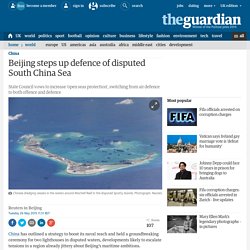
In a policy document issued by the State Council, the country’s cabinet, China vowed to increase its “open seas protection”, switching from air defence to both offence and defence, and criticised neighbours who take “provocative actions” on its reefs and islands. China has been taking an increasingly assertive posture over the disputed waters of the South China Sea, where Beijing has engaged in land reclamation in the Spratly archipelago. Last week it criticised Washington after a US spy plane flew over areas near the reefs. It has overlapping claims with the Philippines, Vietnam, Malaysia, Taiwan and Brunei in the South China Sea, through which $5tn (£3.25tn) in ship-borne trade passes every year.
South China Sea tensions escalate as China unveils plans for lighthouses. China unveiled a military strategy on Tuesday to project naval power further from its own shores and announced plans for two lighthouses on reefs in the South China Sea, moves likely to increase tensions with Washington and regional powers over the disputed waters.
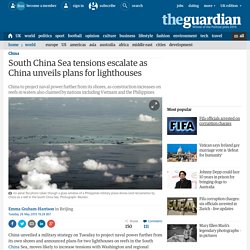
A white paper issued by China’s state council, or cabinet, said the navy will shift from a policy of defending offshore waters to a combined goal of “offshore waters defence and open seas protection”. Vietnam Mulling New Strategies to Deter China. International media coverage of the confrontation between China and Vietnam over Beijing’s placement of a mega oil rig in waters claimed by Vietnam has dried up with the passage of time.
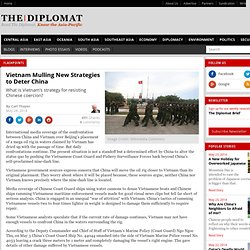
But daily confrontations continue. The present situation is not a standoff but a determined effort by China to alter the status quo by pushing the Vietnamese Coast Guard and Fishery Surveillance Forces back beyond China’s self-proclaimed nine-dash line. Vietnamese government sources express concern that China will move the oil rig closer to Vietnam than its original placement. They worry about where it will be placed because, these sources argue, neither China nor Vietnam knows precisely where the nine-dash line is located. Media coverage of Chinese Coast Guard ships using water cannons to douse Vietnamese boats and Chinese ships ramming Vietnamese maritime enforcement vessels made for good visual news clips but fell far short of serious analysis.
China has the power to sink Vietnamese boats in the South China Sea. Photo by ChinaFotoPress/ChinaFotoPress via Getty Images The South China Sea looks like a tongue hanging down from the Chinese mainland to its north.
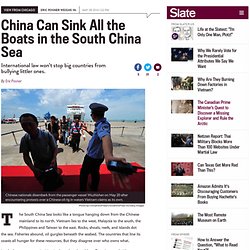
Vietnam lies to the west, Malaysia to the south, the Philippines and Taiwan to the east. Rocks, shoals, reefs, and islands dot the sea. Fisheries abound, oil gurgles beneath the seabed. The countries that line its coasts all hunger for these resources. Lately the temperature is rising in these decades-old conflicts. Both Vietnam and the Philippines have strong claims, and so it might seem reasonable for them to seek arbitration. Tipping points to Asia’s future. A week, it is said, is a long time in politics.
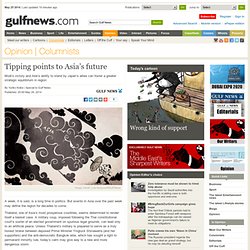
But events in Asia over the past week may define the region for decades to come. Thailand, one of Asia’s most prosperous countries, seems determined to render itself a basket case. A military coup, imposed following the Thai constitutional court’s ouster of an elected government on spurious legal grounds, can lead only to an artificial peace. Unless Thailand’s military is prepared to serve as a truly honest broker between deposed Prime Minister Yingluck Shinawatra (and her supporters) and the anti-democratic Bangkok elite, which has sought a right to permanent minority rule, today’s calm may give way to a new and more dangerous storm.
US-China To Set Up Video Hotline, Talk Of Joint Exercises. PENTAGON: Interspersed with strong declarations by Gen.
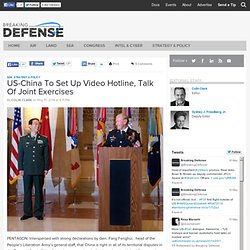
Fang Fenghui, head of the People’s Liberation Army’s general staff, that China is right in all of its territorial disputes in the East and South China Seas, there were clear indications that the United States and China are grappling with how to craft a more stable and more intimate set of military to military relationships. Much of the rhetoric from Gen. Fang sounded pretty uncompromising. On the subject of the Haiyang Shiyou 981 oil platform off the coast of Vietnam, he made clear China would drill for oil no matter what Vietnam thinks. The rig is within the 12-mile limit of Chinese territorial waters so China has every right to drill there, he said. Vietnam riots: China accuses US as military chiefs meet in Washington. Top military leaders of China and the US have exchanged firm warnings in Washington over the escalation of tensions in the South China Sea, where Beijing's deployment of an oil rig has sparked violence in Vietnam against Chinese people and foreign commercial interests.

The US vice-president, Joe Biden, told the visiting General Fang Fenghui that the US was "seriously concerned" about China's unilateral actions in the territorial dispute with Vietnam. Biden told Fang the US did not take a side in the confrontation between China and Vietnam but no nation should take provocative steps that undermined stability and peace. In a subsequent press briefing Fang, the Chinese army's chief of general staff, was unapologetic and accused the US of inflaming South China Sea tensions with its military "pivot" to Asia, saying "some neighbouring countries" were using it as a chance to provoke problems.
Dempsey Clashes with Chinese General On Pacific. A top Chinese general Thursday strongly defended Beijing's territorial claims over disputed islands in the South and East China Seas and charged that the U.S. rebalance of forces to the Pacific was encouraging unrest in the region.
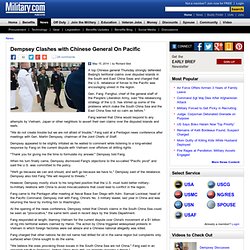
Gen. Fang Fenghui, chief of the general staff of the People's Liberation Army, said "the rebalancing strategy of the U.S. has stirred up some of the problems which make the South China Sea and the East China Sea not so calm as before. " Fang warned that China would respond to any attempts by Vietnam, Japan or other neighbors to assert their own claims over the disputed islands and reefs. "We do not create trouble but we are not afraid of trouble," Fang said at a Pentagon news conference after meetings with Gen. Martin Dempsey, chairman of the Joint Chiefs of Staff.
Dempsey appeared to be slightly irritated as he waited to comment while listening to a long-winded response by Fang on the current dispute with Vietnam over offshore oil drilling rights. China’s ‘Peaceful Rise’ and the South China Sea. To Beijing, its conduct in the South China Sea does not contradict promises of a “peaceful rise” for China.
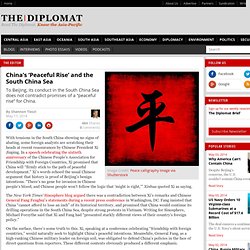
With tensions in the South China showing no signs of abating, some foreign analysts are scratching their heads at recent reassurances by Chinese President Xi Jinping. In a speech celebrating the sixtieth anniversary of the Chinese People’s Association for Friendship with Foreign Countries, Xi promised that China will “firmly stick to the path of peaceful development.” Xi’s words echoed the usual Chinese argument that history is proof of Beijing’s benign intentions. “There’s no gene for invasion in Chinese people’s blood, and Chinese people won’t follow the logic that ‘might is right,’” Xinhua quoted Xi as saying.
The New York Times’ Sinosphere blog argued there was a contradiction between Xi’s remarks and Chinese General Fang Fenghui’s statements during a recent press conference in Washington, DC. The New Triangular Diplomacy: India, China and America at Sea. As both China and India rise as naval powers their interaction with the United States will truly be a defining feature in the Indo-Pacific region.
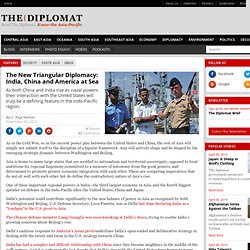
By C. Raja Mohan for The Diplomat November 05, 2012 Facebook7 Twitter0 Google+2 LinkedIn0 As in the Cold War, so in the current power play between the United States and China, the rest of Asia will simply not submit itself to the discipline of a bipolar framework. Asia is home to many large states that are wedded to nationalism and territorial sovereignty, opposed to local ambitions for regional hegemony,committed to a measure of autonomy from the great powers, and determined to promote greater economic integration with each other.
Submarine Developments in Asia. There’s been some recent developments in the submarine world in Asia. First, the Bangkok Post is reporting that Royal Thai Navy’s plans to purchase six used German submarines has been recently rejected by the country’s Defence Minister after an oversight committee recommended that the navy reexamine the cost-effectiveness of the project. The previous Thai government approved the creation of a submarine force which has so far been fully manned, though does not currently possess any boats. The six U206A diesel-electric submarines proposed for purchase were introduced into German service in 1971, and were decommissioned in 2010, according to the report.
India. US China. South China Sea Tensions. India Maoist insurgency.